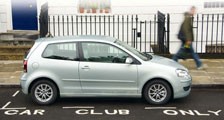Organisations that introduce a pool car scheme or give employees access to a car club have found they can wipe out a large slice of grey fleet mileage.
The lack of mileage inflation, where drivers round up claims, is thought to account for an average reduction of 12%, but the removal of generous reimbursement rates helps to drive down annual mileages by a further 10%.
As a result, fleets can find substantial savings – welcome news for cash-strapped public sector organisations (see table below).
A pilot scheme at Croydon Council, involving car club Zipcar, reduced car travel costs by 42%, from £1.3 million to £756,000, and almost halved business miles from 1.1 million miles to 642,000 miles per year.
The council also cut employee CO2 emissions by more than a third (36%), from 324 tonnes to 207 tonnes annually.
Zipcar gives council employees exclusive use of 23 vehicles from 8am to 6pm, Monday to Friday. Outside of these hours, the vehicles are available to the car club’s members in the local authority area.
Councillor Sara Bashford, Croydon Council’s cabinet member for corporate and voluntary services, said: “The immediate impact on car usage and costs is clear, and we’ve established processes to ensure our carbon emissions are checked and evaluated on a monthly basis.”
Before the Countryside Council for Wales was merged into Natural Resources Wales earlier this year, it had slashed its annual grey fleet mileage from 838,000 miles eight years ago to only 69,000 miles last year. It introduced a 25ppm flat rate for staff when a hire or pool car was a valid option.
A wide range of reimbursement rates are used for grey fleet mileage in the public sector. These include HMRC-approved allowances of 45ppm up to 10,000 miles and 25ppm thereafter, and the NJC scheme of up to 65ppm.
In the private sector, where grey fleet mileage is less prevalent, the HMRC rates are often applied, because they have no tax implications for either employer or employee.
So for most organisations, 45ppm is the benchmark operating cost to equal or improve upon if considering providing a pool car scheme or a car club to grey fleet drivers.
To achieve this, the Energy Saving Trust says both car club and pool vehicle operators must optimise utilisation.
A typical pool car, for example a Vauxhall Corsa or Ford Fiesta, needs to cover about 12,000 miles per year to break even with the HMRC rate.
For organisations with a small operational area, such as an urban authority, it can be hard to achieve this mileage via daily business use.
Most car clubs charge an hourly rate (typically £4 to £5 per hour) and a mileage rate to cover fuel, maintenance and repairs (around 20ppm), and some include an element of mileage in the hourly rate.
At £4 per hour and 20ppm, journeys that average more than 16 miles per hour (distance travelled) will be cheaper than the HMRC rate.
The savings achieved by removing the financial incentive to drive depend on the current remuneration system.
If staff are reimbursed at the highest NJC rate of 65ppm, then moving to a car club – or even a pool fleet – should result in a significant reduction in total mileage.
Even at the HMRC rate of 45 pence per mile, mileage reductions of more than 10% have been observed.
The saving from overall mileage reduction is the most significant because it not only saves 100% of the mileage rate, but also saves staff time, which, at a typical payroll cost of £30 per hour, can mean significant cost savings (see table below).
“It’s all about making the savings while maintaining the services,” said Chris Endacott, director of Gfleet Services and author of the Energy Saving Trust’s car club guide.
He told delegates at a recent Carplus seminar in Manchester that the benefits of switching grey fleet use to car clubs can be defined in financial or environmental terms.
For example, 392 litres of diesel is equivalent to one tonne of CO2 or £463 excluding VAT.
“You can talk to your environmental officer and tell him you’ve saved a tonne of CO2 and you can go to the finance director and tell him you saved £463,” said Endacott.
The only problem many organisations will face in assessing whether or not to introduce a car club scheme is establishing their mileage profile. Grey fleet mileages still remain an unknown quantity for many fleets.





















Login to comment
Comments
No comments have been made yet.